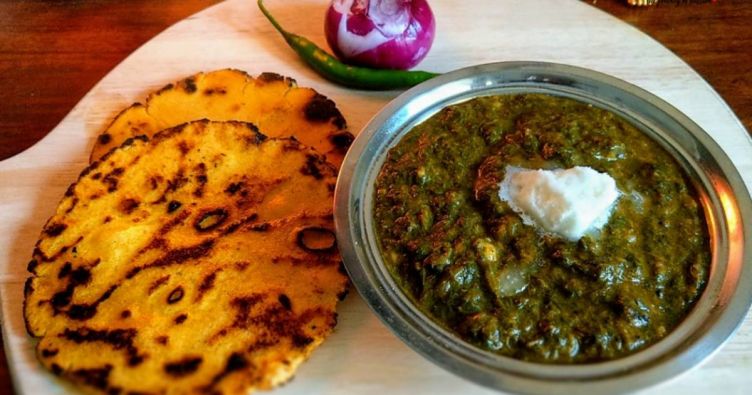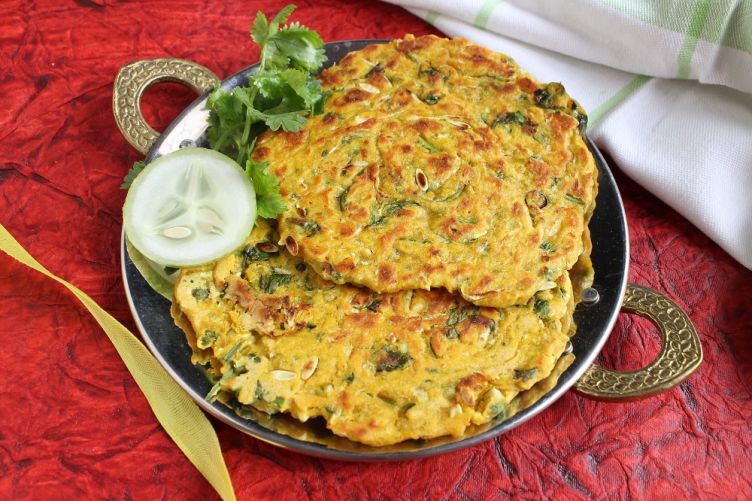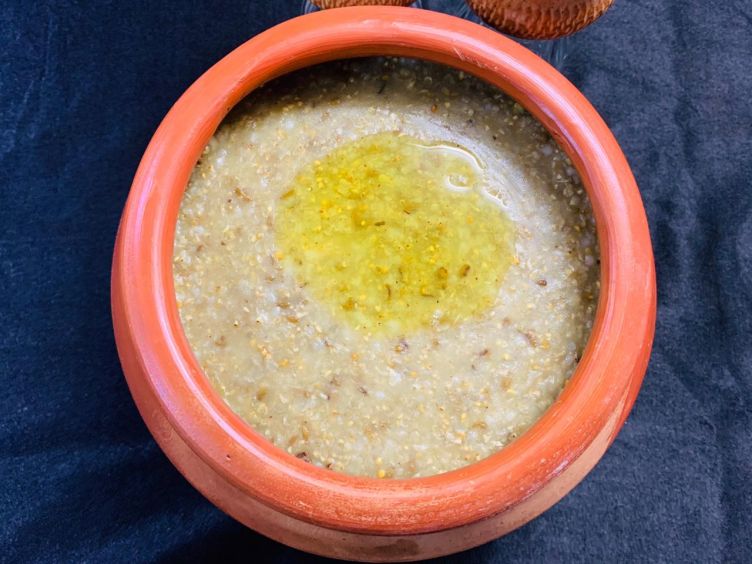_675d2364094ad.jpg)
Are you simply bored up eating the routine breakfast of omelets, cornflakes and oats every day? If looking for something new, healthy and tasty…then these Indian breakfast recipes are for you. The best part is this section covers the best from all over India. Come explore –
Makke ki roti and Sarson da saag-

The first dish that we bring to you is right up from the north of India. The mustard greens, spinach, radish leaves and bathua blended together in a curry, then eaten along with the maize flour flatbread is just so yum. Okay let’s make it easy for you, the maize flour flat bread is simply your authentic ghee embraced makke ki roti.
Without much delay, and not making your taste buds suffer for long, let’s get on to the recipe. Lohri is still far, why not try making the dish today.
The ingredients you need are – 300g mustard leaves, 150gm spinach, a cup of bathua (chenopodium album), (garlic 6 cloves), ginger (1.5 inch), green chilies (2) all chopped well, Asofoetida, red chili powder, cumin seeds, coriander, maize flour, onion (1), tomato (1), ghee or butter, salt and water.
Let’s get to work now. It would take you approx. 60 minutes for readying the breakfast. Firstly, we will prepare the Sarson ka saag – Properly wash mustard greens, spinach and bathua, then rinse off. Make sure you have all the tender leaves for the saag. Take a pressure cooker, put 2 tablespoons of desi ghee. Then add half of the chopped garlic, ginger and green chilies. Put all the leaves and half a cup of water. Cook for a whistle. After it cools down, blend it in a mixer. Then, take another pan, put desi ghee. When it heats up, add asofoetida and cumin seeds. When it splutters, add remaining garlic, ginger and green chilies. Let it saute well. After this, put onion to it. When it turns golden brown, add the chopped tomato to it. Now you can add the coriander, red chili powder and salt. Let the mixture saute well.
It’s time to add the green blended leaves to the mixture. Cover the lid of the pan and cook on a low flame. After a while, you can add maize flour to it. Cook it for another two minutes. Pour ghee or butter before serving.
Let’s finish up the makke ki roti now. You need – 1.5 cups of cornmeal or maize flour, ½ cup wheat flour, ½ tsp carom seeds, a handful of chopped coriander leaves, ½ tsp salt and a cup of hot water.
Take a bowl, pour all the ingredients. After this, you can add the hot water. Mix it well and keep aside. After a while, when the water warms down, start kneading the dough. While kneading, ensure that the dough is not very sticky nor dry with cracks. When the dough is ready, get going with the rolling pin. Cook it on the skillet using ghee or oil.
With these, you are ready to eat the sarson ka saag and makke ki roti. Enjoy your meal.
Thalipeeth –

This Indian dish comes from the west, the state of Maharashtra and northern Karnataka. It is a healthy and authentic traditional multigrain flatbread, which contains a wholesome nutrition of jowar (sorghum), bajra (pearl millet) and wheat flour together called as the bhajani. The dish is a staple of Maharashtra. Let us start cooking this mouth filling dish –
The ingredients used make the bhajani are - 1kg bajra, 500g jowar, 500g rice, 500g chana dal, 250gm of urad dal, moon dal (skinned) and coriander seeds.
We start with making the bhajani. Wash all the ingredients except coriander seeds. Dry them on a fresh cloth and leave for a while. Then roast these ingredients separately. Cool it all and grind well to make a fine flour.
Now comes the process of making the Thalipeeth. You need a cup of bhajani, onion, 2-3 green chilies, coriander (all chopped), salt, water, peanut oil. To cook it we – Mix all the ingredients together, pour water and knead it into a dough. Place the skillet on the stove. Make a ball out of the dough. Place the ball on a parchment at your kitchen surface. Gently pat on the ball, make a 5mm disk in a 12 – 15 cm diameter. Now make a hole to it. List the parchment on the hot skillet. Now remove the paper and let the thalipeeth cook. Put oil on the center and the edges. Cover with a lid and cook it until it turns golden brown. This way you can cook all of the flatbreads.
The thalipeeth can be served with butter, ghee or curd. Enjoy the delicacy.
Bajre ka khichda –

Pearl millet, your desi bajra with lentils, ghee poured from the top can be a perfect combination to eat a delicacy during winters. All these together form the most famous dish of Rajasthan, Haryana and some other parts of North India - the Bajre ka khichda. It is also known as the Pearl millet khichdi. The dish keeps the body warm and full of energy when eaten in mornings.
10 ingredients and just 30 minutes, you have the easiest recipe for your winter breakfast. You need – pearl millet, moong dal, green chili, ginger, cumin seeds, asafoetida, turmeric powder, water, salt, ghee or oil.
Let’s start preparing – Take ½ cup bajra in a mixer grinder. Form a coarse mixture of the millet. Now pour the bajra in some water. After a while, the husk particles float on it. After this, drain all the water from the bowl. Soak ½ cup moong dal in another bowl.
We get going with the Bajre ki khichdi now. Take a pressure cooker and heat 2 tsp of ghee or oil in it. Add 1 tsp cumin seeds to it. When they splutter, add a tsp of finely chopped ginger and green chilies, stir and fry for a while. Add the coarse bajra mix to it. Saute it for a while and keep stirring, so that it doesn’t sticks to the bottom. Add 1/4th tsp turmeric powder with a pinch of asafoetida. Pour two cups of water. Add salt as per the taste. Cover the pressure cooker and let it cook for 4 – 5 whistles. When you will open the cooker, the bajra will be half cooked. Remove the water from the soaked moong dal and add it to the bajra with 2 cups of water. Stir well and close the lid. Cook it again for 7 – 8 whistles. Make sure when you check the khichdi, it is not very thick. Add water if it is and cook on a low flame.
The bajre ka khichda is now ready for serving. Garnish it with some coriander or mint leaves. Pour ghee on the top. You can savor the khichdi with some chaas (buttermilk), yoghurt or kadi. Happy eating!
That’s how you can have a wholesome winter breakfast. That too, which is the best from India, which have been eaten since ages and are healthy too!